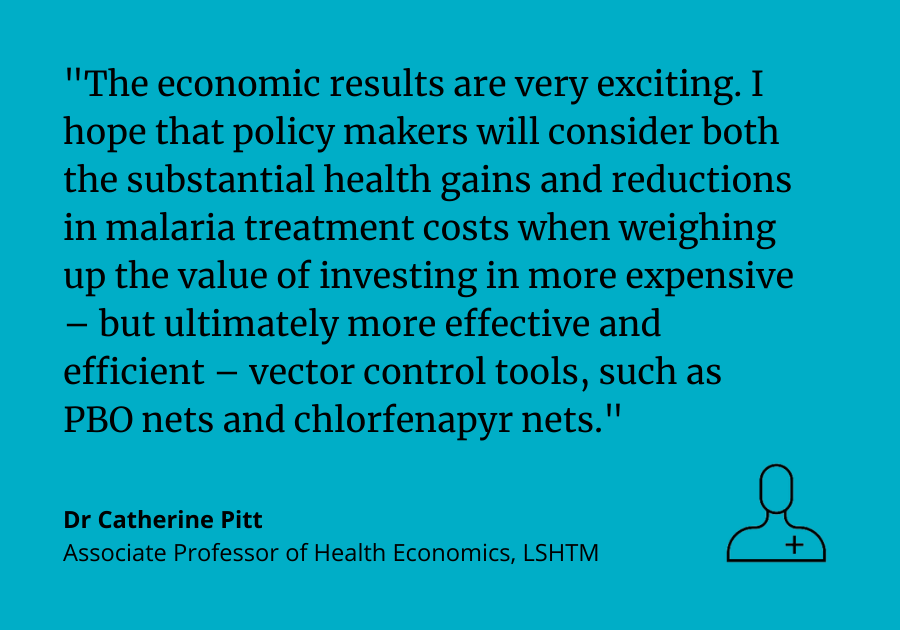
A novel class of bed net that kills mosquitoes resistant to traditional insecticides by making them unable to move or fly, significantly reduces malaria infection in children, according to new research published in The Lancet.
Unlike other insecticides which kill the mosquito via the nervous system, the effects of the new bed net mean the mosquito dies from starvation or being unable to fend for itself.
The two-year community randomised trial involved more than 39,000 households and followed over 4,500 children aged 6 months to 14 years in Tanzania. It found that a long-lasting insecticidal net (LLIN) treated with two insecticides, chlorfenapyr and pyrethroid (chlorfenapyr LLIN), reduced the prevalence of malaria by 43% and 37% in the first and second year respectively, compared to the standard pyrethroid-only long-lasting insecticidal net (LLIN).
Chlorfenapyr LLINs also reduced clinical episodes of malaria by 44% over the two years and the number of malaria-infected mosquitoes captured by 85%.
The study was conducted by the London School of Hygiene & Tropical Medicine (LSHTM), National Institute for Medical Research in Tanzania, Kilimanjaro Christian Medical University College in Tanzania, and the University of Ottawa, Canada.
The researchers assessed the cost-effectiveness of chlorfenapyr LLINs by estimating their cost per ‘disability-adjusted life-year’ (DALY) averted. DALYs are used by the World Health Organisation to measure the global burden of disease.
The study found that chlorfenapyr LLINs were cost-effective in this setting as the higher costs of the nets were offset by the savings from reducing the number of malaria cases requiring treatment. Distributing chlorfenapyr LLINs is therefore expected to cost households and society less overall than standard, PBO, or pyriproxyfen nets.
The study also found that PBO nets were more effective than standard nets, and would also be cost-effective compared with standard nets. PBO nets would therefore be a good alternative where chlorfenapyr nets are not available, or potentially as part of a strategy of using a variety of net types to mitigate against insecticide resistance.
Dr Catherine Pitt, Associate Professor of Health Economics at LSHTM, who conducted the study’s cost-effectiveness analysis, said: “The economic results are very exciting. I hope that policy makers will consider both the substantial health gains and reductions in malaria treatment costs when weighing up the value of investing in more expensive – but ultimately more effective and efficient – vector control tools, such as PBO nets and chlorfenapyr nets.”
Despite the positive results, the study also identified problems with the durability of many of the LLINs, which quickly developed holes and, in some cases, lost their active chemical ingredients within the first two years of use. Dr Pitt said: “Academics and policy makers need to work together to create the right incentive structures for the manufacturers of these nets so they produce nets that last. This means making sure that key agencies like The Global Fund to Fight AIDS, Tuberculosis and Malaria account for differences in durability and impact when choosing between different types of nets.”
Our postgraduate taught courses provide health practitioners, clinicians, policy-makers, scientists and recent graduates with a world-class qualification in public and global health.
If you are coming to LSHTM to study a distance learning programme (PG Cert, PG Dip, MSc or individual modules) starting in 2024, you may be eligible for a 5% discount on your tuition fees.
These fee reduction schemes are available for a limited time only.
